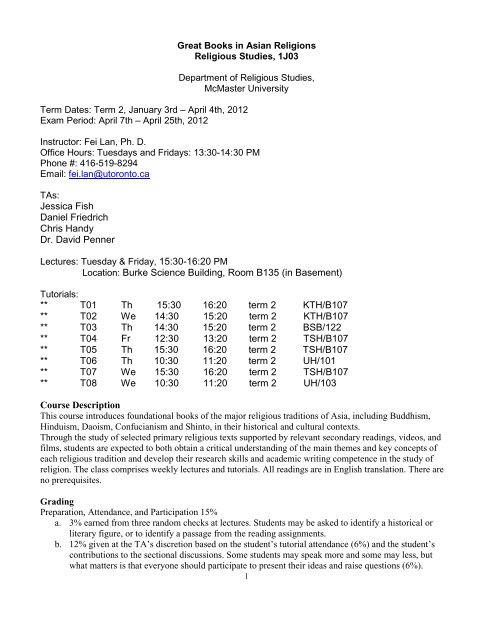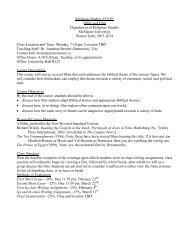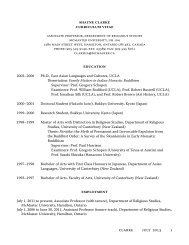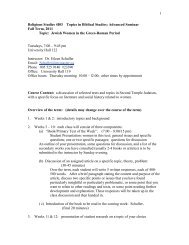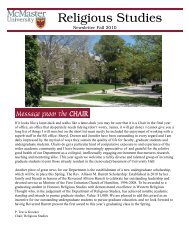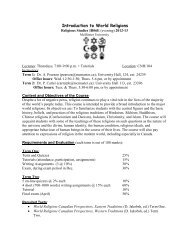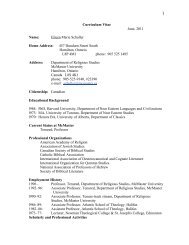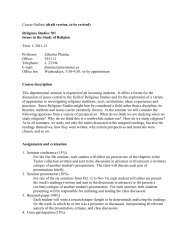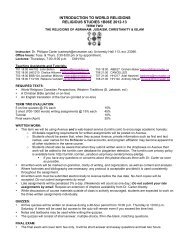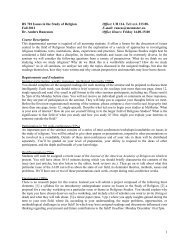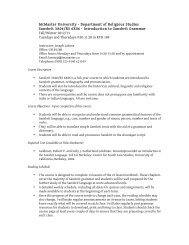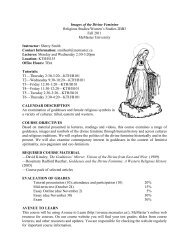RS 1J03.pdf - Department of Religious Studies - McMaster University
RS 1J03.pdf - Department of Religious Studies - McMaster University
RS 1J03.pdf - Department of Religious Studies - McMaster University
Create successful ePaper yourself
Turn your PDF publications into a flip-book with our unique Google optimized e-Paper software.
Great Books in Asian Religions<br />
<strong>Religious</strong> <strong>Studies</strong>, 1J03<br />
<strong>Department</strong> <strong>of</strong> <strong>Religious</strong> <strong>Studies</strong>,<br />
<strong>McMaster</strong> <strong>University</strong><br />
Term Dates: Term 2, January 3rd – April 4th, 2012<br />
Exam Period: April 7th – April 25th, 2012<br />
Instructor: Fei Lan, Ph. D.<br />
Office Hours: Tuesdays and Fridays: 13:30-14:30 PM<br />
Phone #: 416-519-8294<br />
Email: fei.lan@utoronto.ca<br />
TAs:<br />
Jessica Fish<br />
Daniel Friedrich<br />
Chris Handy<br />
Dr. David Penner<br />
Lectures: Tuesday & Friday, 15:30-16:20 PM<br />
Location: Burke Science Building, Room B135 (in Basement)<br />
Tutorials:<br />
** T01 Th 15:30 16:20 term 2 KTH/B107<br />
** T02 We 14:30 15:20 term 2 KTH/B107<br />
** T03 Th 14:30 15:20 term 2 BSB/122<br />
** T04 Fr 12:30 13:20 term 2 TSH/B107<br />
** T05 Th 15:30 16:20 term 2 TSH/B107<br />
** T06 Th 10:30 11:20 term 2 UH/101<br />
** T07 We 15:30 16:20 term 2 TSH/B107<br />
** T08 We 10:30 11:20 term 2 UH/103<br />
Course Description<br />
This course introduces foundational books <strong>of</strong> the major religious traditions <strong>of</strong> Asia, including Buddhism,<br />
Hinduism, Daoism, Confucianism and Shinto, in their historical and cultural contexts.<br />
Through the study <strong>of</strong> selected primary religious texts supported by relevant secondary readings, videos, and<br />
films, students are expected to both obtain a critical understanding <strong>of</strong> the main themes and key concepts <strong>of</strong><br />
each religious tradition and develop their research skills and academic writing competence in the study <strong>of</strong><br />
religion. The class comprises weekly lectures and tutorials. All readings are in English translation. There are<br />
no prerequisites.<br />
Grading<br />
Preparation, Attendance, and Participation 15%<br />
a. 3% earned from three random checks at lectures. Students may be asked to identify a historical or<br />
literary figure, or to identify a passage from the reading assignments.<br />
b. 12% given at the TA’s discretion based on the student’s tutorial attendance (6%) and the student’s<br />
contributions to the sectional discussions. Some students may speak more and some may less, but<br />
what matters is that everyone should participate to present their ideas and raise questions (6%).<br />
1
Two reflection papers, double-spaced, 4-5 pages maximum (10% each) 20%<br />
(Or ONE 15 page long essay instead, with the approval <strong>of</strong> the instructor, 20%)<br />
Three tests (10% each) 30%<br />
Final exam 35%<br />
Course Requirements<br />
1. It is mandatory to attend both lectures and tutorials and participate actively in class meetings;<br />
2. Complete the reading assignments prior to coming to each class; prepare two questions or make two points<br />
about the reading materials for discussion at each weekly tutorial;<br />
3. Submit on time two 4-5 page double-spaced typed (12 point maximum) reflection papers (or ONE 15 page<br />
long essay instead). No late work will be accepted without a documented medical excuse. The paper<br />
assignments which involve close reading, textual analysis, and critical reflection are meant to develop<br />
students’ critical thinking and writing skills. Each reflection paper is expected to (1) provide a concise<br />
discussion <strong>of</strong> the target passage(s) in the reading assignments and (b) develop a critical reflection on the topic<br />
at hand. Creativity is greatly encouraged. The long essay is expected to demonstrate the ability to define a<br />
topic, to compare a topic statement, and to make an argument with sufficient support <strong>of</strong> the primary readings<br />
and appropriate use <strong>of</strong> the secondary sources.<br />
4. The THREE tests and the final exam will cover both reading and lecture materials. Please note that NO test<br />
or exam will be rescheduled without a documented medical excuse.<br />
Required Course Texts (The texts that are not available online in the <strong>McMaster</strong> <strong>University</strong> library will be<br />
available for purchase at the <strong>McMaster</strong> <strong>University</strong> bookstore.)<br />
1. Easwaran, Eknath (trans. with introduction), The Bhagavad Gita, (Nilgiri Press, c1985, 2007).<br />
1 copy available ONLINE<br />
http://libaccess.mcmaster.ca/login?url=http://www.MCMU.eblib.com/EBLWeb/patron?target=patron&ext<br />
endedid=P_478541_0&<br />
2. Watson, Burton (trans.) The Lotus Sutra, (New York: Columbia <strong>University</strong> Press, 1993)<br />
(Amazon.com $11.92-$15.54).<br />
3. Slingerland, Edward, Essential Analects : Selected Passages with Traditional Commentary<br />
(Hackett Publishing Company, Inc., 2009)<br />
1 copy available ONLINE<br />
http://mcmaster.sirsidynix.net/uhtbin/cgisirsi/?ps=LEv3MBDQbY/MILLS/114830043/123#<br />
4. Lau, D. C. (trans.) Mencius (London: Penguin Classics, 1970)<br />
(Amazon.com $8-$16).<br />
5. Watson, Burton (trans.) Hsun Tzu (New York: Columbia <strong>University</strong> Press, 1967).<br />
Also, available in the e-book Basic Writings <strong>of</strong> Mo Tzu, Hsun Tzu, and Han Fei Tzu, translated by<br />
Burton Watson, (New York: Columbia <strong>University</strong> Press, 1967).<br />
1 copy available ONLINE<br />
http://libaccess.mcmaster.ca/login?url=http://hdl.handle.net/2027/heb.06027<br />
6. Graham, A.C. (trans.) Chuang- tzu: the Inner Chapters (Indianapolis: Hackett Pub. Co., 2001)<br />
7. Basil Hall Chamberlain (trans.) The Kojiki: Records <strong>of</strong> Ancient Matters (Tuttle Publishing, c 1982,<br />
2005)<br />
Also available at Sacred-Texts Shinto online<br />
http://www.sacred-texts.com/shi/kojiki.htm<br />
2
Suggested Readings<br />
1. Knott, Kim. Hinduism: A Very Short Introduction (Oxford <strong>University</strong> Press, 1998)<br />
1 copy available ONLINE<br />
http://mcmaster.sirsidynix.net/uhtbin/cgisirsi/?ps=TG6xzHYnAF/MILLS/125900022/123#<br />
2. Keown, Damien. Buddhism: A Very Short Introduction (Oxford <strong>University</strong> Press, 1996)<br />
1 copy available ONLINE<br />
http://mcmaster.sirsidynix.net/uhtbin/cgisirsi/?ps=w6ecXy1H7G/MILLS/125900022/9#<br />
3. Taylor, Rodney. Confucianism (Infobase Publishing, 2004)<br />
1 copy available ONLINE<br />
http://mcmaster.sirsidynix.net/uhtbin/cgisirsi/?ps=ogCNYECoa4/MILLS/125900022/9#<br />
4. Fingarette, Herbert. Confucius: The Secular as Sacred (Illinois: Waveland Press, 1998).<br />
1 copy available MILLS LIBRARY (call # B 128 .C8 F48)<br />
5. Hartz, Paula. Daoism.<br />
1 copy available ONLINE<br />
http://mcmaster.sirsidynix.net/uhtbin/cgisirsi/?ps=vQIAg2aJNr/MILLS/125900022/9#<br />
Recommended Videos and Film<br />
1. “Religions <strong>of</strong> the World - Hinduism” at Google Videos (47 minutes)<br />
(http://video.google.com/videoplay?docid=6016765754275133214#)<br />
2. “Buddhism, Taoism, and Confucianism in China” at Google Videos (17 minutes)<br />
(http://www.youtube.com/watch?v=-gZY4i4Kg3s) or<br />
(http://video.google.com/videoplay?docid=-2173173691246135944#)<br />
3. “Shinto: Nature, Gods and Man in Japan” by Peter Grilli and David Westphal, Videocassette (45<br />
minutes).<br />
Academic Integrity<br />
You are expected to exhibit honesty and use ethical behaviour in all aspects <strong>of</strong> the learning process.<br />
Academic credentials you earn are rooted in principles <strong>of</strong> honesty and academic integrity. Academic<br />
dishonesty is to knowingly act or fail to act in a way that results or could result in unearned academic credit or<br />
advantage. This behaviour can result in serious consequences, e.g. the grade <strong>of</strong> zero on an assignment, loss <strong>of</strong><br />
credit with a notation on the transcript (notation reads: “Grade <strong>of</strong> F assigned for academic dishonesty”), and/or<br />
suspension or expulsion from the university. It is your responsibility to understand what constitutes academic<br />
dishonesty. For information on the various types <strong>of</strong> academic dishonesty please refer to the Academic<br />
Integrity Policy, located at www.mcmaster.ca/academicintegrity<br />
The following illustrates only three forms <strong>of</strong> academic dishonesty:<br />
1. Plagiarism, e.g. the submission <strong>of</strong> work that is not one’s own or for which other credit has been obtained.<br />
2. Improper collaboration in group work.<br />
3. Copying or using unauthorized aids in tests and examinations.<br />
Turnin.com<br />
In this course we will be using a web-based service (Turnitin.com) to reveal plagiarism. Students will be<br />
expected to submit their work electronically to Turnitin.com and in hard copy so that it can be checked for<br />
academic dishonesty. Students who do not wish to submit their work to Turnitin.com must still submit a copy<br />
to the instructor. No penalty will be assigned to a student who does not submit work to Turnitin.com. All<br />
submitted work is subject to normal verification that standards <strong>of</strong> academic integrity have been upheld (e.g.,<br />
on-line search, etc.). To see the Turnitin.com Policy, please go to www.mcmaster.ca/academicintegrity<br />
3
E-mail Communication Policy<br />
Effective September 1, 2010, it is the policy <strong>of</strong> the Faculty <strong>of</strong> Social Sciences that all email<br />
communication sent from students to instructors (including TAs), and from students to staff, must<br />
originate from the student’s own <strong>McMaster</strong> <strong>University</strong> e-mail account.<br />
This policy protects confidentiality and confirms the identity <strong>of</strong> the student. It is the<br />
student’s responsibility to ensure that communication is sent to the university from a<br />
<strong>McMaster</strong> account. If an instructor becomes aware that a communication has come from an alternate<br />
address, the instructor may not reply at his or her discretion. Email<br />
Forwarding in MUGSI: http://www.mcmaster.ca/uts/support/email/emailforward.html<br />
*Forwarding will take effect 24-hours after students complete the process at the above<br />
link.<br />
<strong>Department</strong> Policy<br />
Staff in the <strong>of</strong>fice <strong>of</strong> the <strong>Department</strong> <strong>of</strong> <strong>Religious</strong> <strong>Studies</strong> will not date-stamp or receive papers and other<br />
assignments.<br />
Course Schedule<br />
Week 1<br />
Jan. 3<br />
Jan. 6<br />
Week 2<br />
Jan. 9<br />
Jan.13<br />
Week 3<br />
Jan. 16<br />
Jan. 20<br />
Hindu <strong>Religious</strong> Traditions<br />
Course Introduction<br />
The Ancient Indian World View: Hindu, Buddhist, & Jain<br />
Vedic Piety and Brahmanical Sacrificial Ritualism<br />
Cosmic and ritual order in Vedic Literature<br />
The Ultimate Reality in the Upanishads<br />
Two Great Epics <strong>of</strong> India<br />
The Ramayana; The Bhagavad Gita<br />
The Bhagavad Gita cont.<br />
Week 4 The Bhagavad Gita Cont.<br />
Jan. 23 Wrap up the Bhagavad Gita<br />
Jan. 27 Test 1<br />
Video clip 1: “The Origins <strong>of</strong> Theravada Buddhism: the Historic Town <strong>of</strong> Sukhotai<br />
and associated towns,” (about 3 minutes)<br />
http://mediateca.educa.madrid.org/reproducir.php?id_video=24n18tu759p2s8qf<br />
Video clip 2: “What is Theravada Buddhism?” (about 4 minutes)<br />
http://www.youtube.com/watch?v=fe-pf5P9R4E&feature=related<br />
Week 5<br />
Jan. 31<br />
Feb. 3<br />
Week 6<br />
Feb. 6<br />
Feb. 10<br />
Buddhism: A Brief Introduction<br />
Theravada Buddhism<br />
Mahayana Buddhism<br />
The Lotus Sutra<br />
Mahayana Buddhism in China<br />
The Lotus Sutra<br />
4
Week 7<br />
Feb. 13<br />
Feb. 17<br />
Week 8<br />
The Lotus Sutra Cont.<br />
The 1 st paper due<br />
The Lotus Sutra cont.<br />
Chinese <strong>Religious</strong> Traditions: Three Teachings<br />
Mid-term Recess: No Class<br />
Week 9 Confucianism and Confucius<br />
Feb. 28 Test 2<br />
Brief Introduction: Confucianism in Its Historical Development<br />
MV clip: Virtue <strong>of</strong> Orchid 幽 蘭 操 (adapted from Confucius’s poem), theme<br />
song <strong>of</strong> the Movie “Confucius” (about 4 minutes)<br />
http://www.youtube.com/watch?v=GsmLaMShfV4&feature=autoplay&list=PL44797F8BE7<br />
BBEC56&lf=results_main&playnext=2<br />
Mar. 2 The Analects <strong>of</strong> Confucius<br />
Week 10<br />
Mar. 6<br />
Mar. 9<br />
Week 11<br />
Mar, 13<br />
Mar. 16<br />
Confucius and Mencius<br />
The Analects cont.<br />
The Mencius (Selections)<br />
Mencius and Xunzi<br />
The Mencius (Selections) cont.<br />
Hsun Tzu (Selections)<br />
Week 12 Daoism<br />
Mar. 20 Test 3<br />
Brief introduction: Daoist philosophy and religious Daoism<br />
Video clip: “Alan Watts - What is Tao?” (about 9 minutes)<br />
(http://www.youtube.com/watch?v=seMgEls_slw&feature=related)<br />
Mar. 23 Chuang- tzu: the Inner Chapters<br />
Week 13 Daoism Cont. and Shinto<br />
Mar. 2 The 2 nd paper due<br />
The long essay due<br />
Chuang- tzu: the Inner Chapters cont.<br />
Mar. 30 Kojiki, Book 1<br />
Week 14<br />
Apr. 3<br />
Final Exam Review<br />
Final Exam Review<br />
(Film: “Shinto: Nature, Gods and Man in Japan”)<br />
Final Exam: TBA<br />
5


